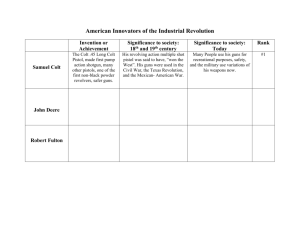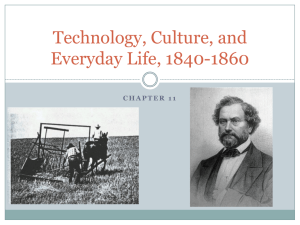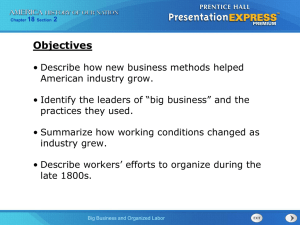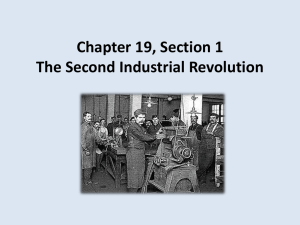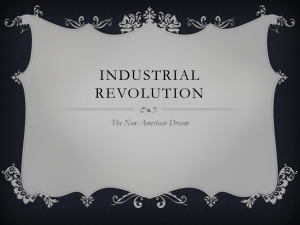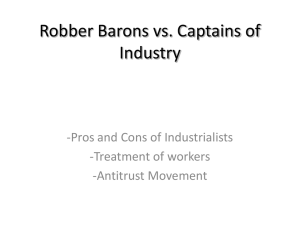Chapter 8 Lesson 1: The Rise of Big Business
advertisement
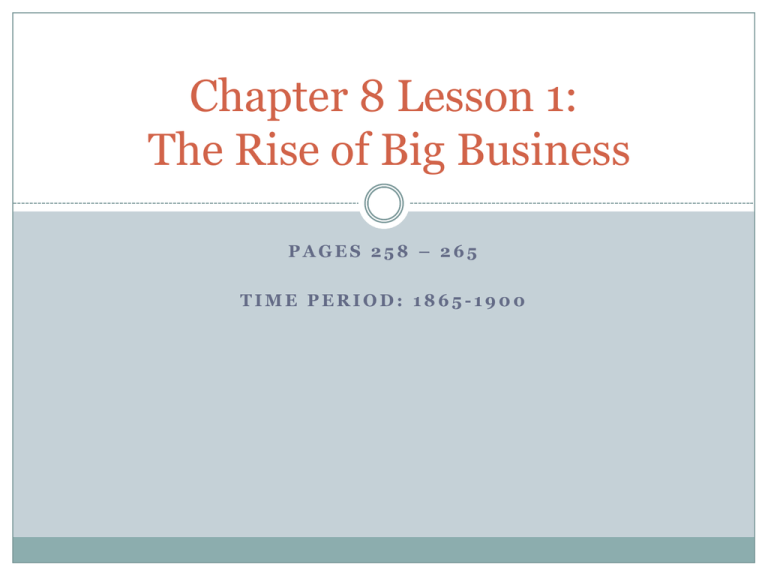
Chapter 8 Lesson 1: The Rise of Big Business PAGES 258 – 265 TIME PERIOD: 1865-1900 A Time of Invention New Inventions saved people time, money, and improved life. People could now do things that were impossible to do before, such as recording sound. Inventions for Home and Work 1872 – Elijah McCoy – invented an oil cup, allowed trains and machines to run longer by dripping oil over moving parts Inventions for Home and Work 1875 – E. Remington and Company Made and sold typewriters Saved office workers time Inventions for Home and Work 1867 – Margaret Knight Made paper bags with a bottom Were able to hold more Inventions for Home and Work 1876 – Alexander Graham Bell – invented the telephone Used by businesses to talk to workers on different floors Used by people at home to talk to family and friends many miles away Inventions for Home and Work 1877 – Thomas Edison Invented the phonograph (record player) Inventions for Home and Work 1879 – Thomas Edison – invented the electric light bulb Cleaner and safer than gas lamps Allowed factories and shops to stay open after dark Big Business 1865 – Henry Bessemer – invented a process to make steel (Bessemer Process) Made steel much less expensive to produce Big Business (continued) Andrew Carnegie built a factory to use the Bessemer Process to make steel rails for railroads Carnegie also bought fuel companies, railroads, and ships – this allowed him to lower the price he paid for getting fuel for his factories as well as shipping costs Corporations John D. Rockefeller founded Standard Oil Company (1870) Made products such as fuel and lamp oil Standard Oil Company was a corporation, a business where many people own shares, or parts of the business Corporations (continued) Corporations pay part of their profits, the money earned after all costs are paid, to share owners Companies Grew Larger Corporations grew larger by selling stocks to raise money Corporations were able to build factories and buy expensive machines with the money Small businesses could not afford to purchase machines or build factories Standard Oil Company grew by buying more oil companies Companies Grew Larger (cont’d.) Rockefeller bought the companies to reduce competition – when more businesses try to sell the same goods or services Competition allows prices to remain low and quality high for consumers Companies Grew Larger (cont’d.) Standard Oil Company became a monopoly because it bought so many companies Monopoly – a company that has no competition Worker’s Lives Change Machines were used to speed up the process of producing goods Good could not be sold at lower prices for people to buy so businesses made more goods and hired more people Factories had unsafe working conditions and many workers were injured or killed in accidents. The Labor Movement Workers were paid poorly Worked for 10-12 hours / day Many children had to work to help their families earn money Workers were fired for complaining about working conditions The Labor Movement Labor Unions, an organization of workers that tried to improve pay and conditions for its members, were formed 1869 – Knights of Labor was formed Wanted to: Make safer working conditions 8 hour work day Stop hiring children STRIKE! Unions used strikes (when workers refused to work) to try to force businesses to make changes 1886 – American Federation of Labor (AFL) • Formed a large group of trade unions (organization of workers who do same types of jobs) Samuel Gompers elected President of AFL Wanted: Better wages Safer conditions Shorter workdays Labor Unions First labor unions failed People were hurt or killed in fights between police and strikers Monopolies blocked progress for workers
